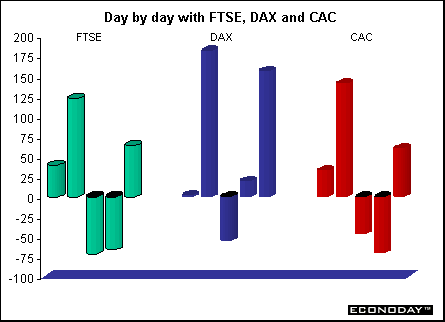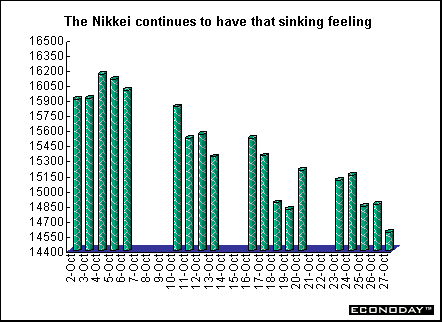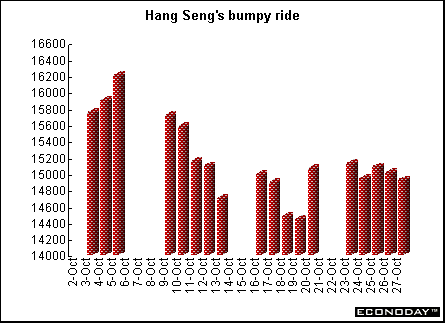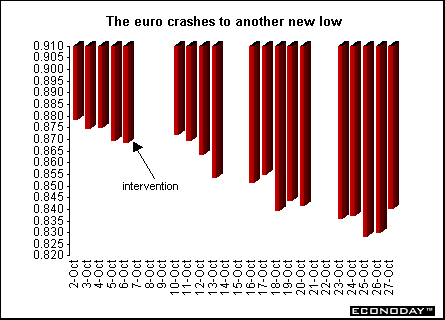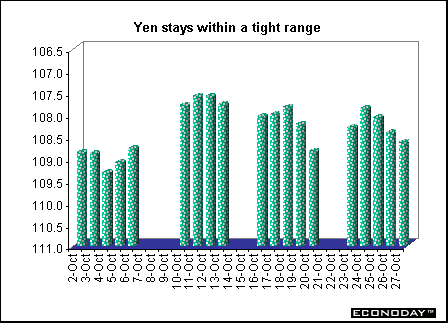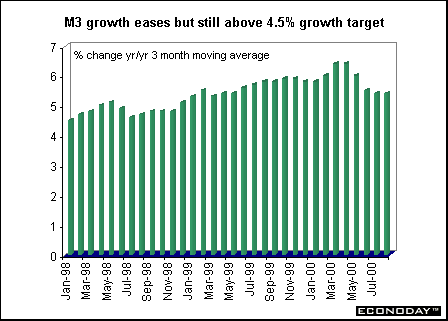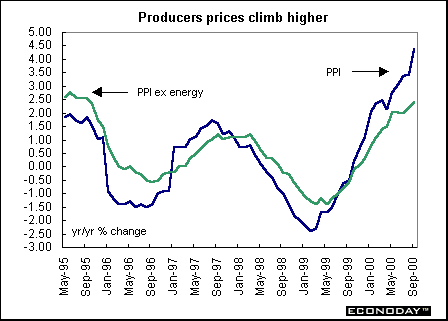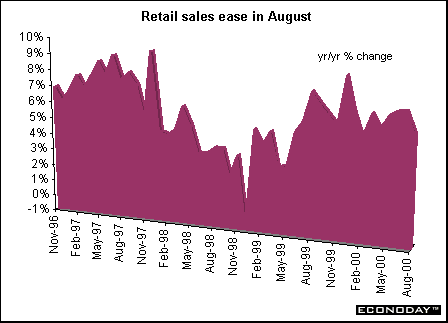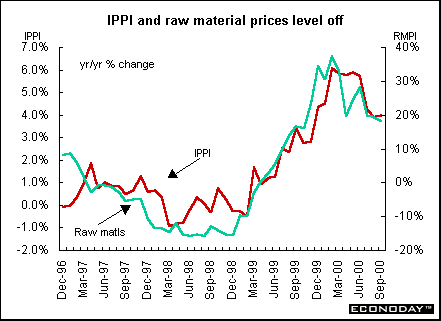| Previous Articles |
|
The rite of fall... The weak euro, which continues to set new lows almost daily, is worrying investors worldwide now, as companies with a presence in European Monetary Union countries issue profit warnings. The link between the weak euro and slowing economic growth is hurting European sales, and international companies' stock prices in turn. Although the euro revived Friday on slower than expected U.S. gross domestic product growth (up 2.7 percent in the advance estimate), the currency is below the September 22 intervention level.
Europe and Britain
As the week ended European stocks rose, led by fiber optic components makers. Analysts now think that semiconductor, mobile phone, and phone equipment stocks have all fallen too far and earnings expectations are too low. The London FTSE 100 gained 90.20 points or 1.44 percent to close at 6366.50. The Frankfurt DAX ended the week at 6924.68. It soared 306.25 points or 4.63 percent on strong gains in the telecommunications and technology sectors. The Paris CAC continued its climb, ending the week at 6268.93, up 119.49 points or 1.94 percent. Asia Japan continues to limp along, growing primarily on the back of government spending packages. As yet, only fragile signs of real growth are apparent. There was good news for Japan on Wednesday when S&P affirmed its AAA credit rating even though they worry about the pace of restructuring and timing of fiscal retrenchment. The Nikkei 225 is currently at a 19 month low. It closed down on the week again, at 14,582.20, losing 616.53 points or 4.06 percent.
On the week, only the Australian all ordinaries and Singapore straits indexes eked out positive finishes, up 7.9 points or 0.25 percent to finish at 3195.70 and up 37.37 points or 1.94 percent at 1961.04, respectively. The Hong Kong Hang Seng continues to trade just above its low for the year. On the year, it has lost 12.14 percent, all of it since the first week of September.
Currencies
But this was after the euro touched all time lows against the dollar and yen as expectations faded that central bankers would again buy the European currency to prop up its value as they did in September. Finance ministers and central bank governors ended a Group of Twenty meeting on Thursday without making a statement supporting the currency. On the week the euro, after sinking to $0.8230, managed to end not much below the previous week's close at $0.84. The yen has been overshadowed by the euro. It continues to trade in a narrow range against the dollar on a stream of tepid economic data. (See indicator scoreboard below.) Consumer prices continue to fall, indicating that deflation continues. With stock prices dropping, there is not much foreign demand to buy equities. Investors are watching the direction of the U.S. economy because it is no secret that a real Japanese recovery must be fed by strong exports.
Indicator scoreboard...
August current account deficit widened to E2.2 billion from a deficit of E1.8 billion in August 1999. For the first eight months of 2000, the EMU current account posted a deficit of E18.9 billion, a sharp deterioration from a surplus of E3.9 billion posted in the same period in 1999. The ECB also revised data for previous years, which resulted in a sharp deterioration in the 1999 current account balance to a deficit of E5.8 billion from the E22.9 billion surplus previously reported. The worsening of the current account in August this year compared to a year earlier was caused by larger deficits in both the income and current transfers accounts. Germany - September seasonally adjusted producer price index jumped 0.9 percent and 4.4 percent when compared with last year. The acceleration again was due largely to higher crude oil prices, which soared 11.6 percent and 35.9 when compared with last year. Excluding oil products, producer prices were up 0.3 percent on the month and 2.4 percent on the year.
September import prices rose 2.3 percent and 13.4 percent when compared with last year. Import prices excluding oil products also shot up, rising 8.1 percent when compared with last year. The rise in ex-oil import prices underlines the effect of the weak euro and could be a worrying inflation signal. Oil prices were up 17.3 percent on the month, while crude oil prices rose 10.8 percent, diesel and light oil were up 21.0 percent. Seasonally adjusted import prices rose 2.4 percent in September and were 13.3 percent higher than a year ago. Seasonally adjusted export prices rose 0.8 percent in September from a month earlier and 4.2 percent on the year. France - September seasonally and workday adjusted consumer spending on manufactured goods dropped 1.2 percent but rose 3.9 percent on the year. Third quarter consumer spending rose 0.4 percent, compared to an increase of 0.7 percent in the second quarter. Declines were recorded across the board in September. Britain - August merchandise trade balance with European Union countries posted a Stg31 million surplus - its first since November 1995. This was only the fifth month of surplus since the series began in 1988. The global trade gap narrowed considerably to Stg2.272 billion in August from a record Stg3.001 billion in July. The improvement was mostly due to the erratics balance (items that fluctuate widely from period to period), because of higher ship and precious stones exports and lower imports of aircraft. The total deficit on both goods and services narrowed considerably to Stg1.413 billion in August, from Stg2.105 billion in July. In value terms exports to non-EU countries fell 2.1 percent in September, while imports rose 0.3 percent. Belgium - September Belgian National Bank's seasonally adjusted composite industry indicator fell back sharply in September, led by a marked decrease in the manufacturing sector. The manufacturing index plunged to minus 0.1 from plus 5.6 in August. Both past export and domestic order indexes dropped sharply. Executives' assessment of overall orders deteriorated while assessment for inventories remained stable. Prospects for demand worsened, while, more surprisingly, outlook for jobs was slightly higher. The price outlook, which does not contribute to the overall index, deteriorated slightly. The Belgian manufacturing sector is widely seen as a leading EMU cyclical indicator, given its concentration on semi-finished goods and the large share of exports to major EMU economies. In recent years, the central bank's industry indicator has shown a fairly close correlation to EMU industry confidence trends six months later. Asia Australia - Third quarter producer price index rose 0.5 percent and 4.6 percent when compared with a year ago, fueled by higher oil prices and a weak Australian dollar. It compares with a 1.8 percent increase the previous quarter for an annual 5 percent rise. It is the only the second time that a producer prices index has been released. Third quarter consumer prices rose 3.7 percent from the second quarter. When compared with a year ago, prices rose 6.1 percent. This is more than double the top of the central bank's target, however, most of the increase reflects a 10 percent tax on most goods and services introduced in July. The central bank has said it will allow for the impact of the tax when it meets on November 7. The Reserve Bank aims to keep annual inflation between 2 percent and 3 percent. The Reserve Bank also looks at core, or underlying inflation, which removes the effect of volatile items, such as energy and food. Underlying inflation was up 3.7 percent in the third quarter and 5.6 percent on the year. Average weekly earnings, excluding overtime pay, rose 1.7 percent in the three months ended August 18. It follows a 1.2 percent rise the previous three months. Wages rose 5.9 percent when compared with last year. Japan - September department store sales rose 1 percent from a year ago. The first increase in sales in seven months was helped by a closing down sale at Sogo Co. and discounts to mark the Tokyo Giants' pennant victory in professional baseball. A separate report showed sales at general merchandise stores fell 7.6 percent from a year ago. Sales have fallen for 22 months from the year-ago level. September retail sales fell 1.5 percent on the year and large stores retail sales fell 3.5 percent. Sales were down 5.0 percent when adjusted for store closings and new stores. September corporate services price index fell 0.1 percent and 0.6 percent when compared with the previous year. The CSPI fell 0.6 percent in August and 0.7 percent in July. Domestic wholesale prices index rose 0.1 percent on the year, after rising 0.2 percent in July. Domestic WPI was down 0.1 on the month. October Tokyo consumer price index rose 0.2 percent but fell 1.2 percent on the year. For all of Japan, September prices were up 0.3 percent but fell 0.8 percent on the year. In both Tokyo and in all of Japan the previous month, furniture prices led the yearly drops while reading and recreation materials led the monthly gains in Tokyo and clothes and footwear in Japan. September industrial production fell 3.4 percent but rose 3.9 percent on the year. Shipments were down 3.6 percent on the month and up 4.2 percent on the year. Inventories were down 1.1 percent on the month and down 0.4 percent on the year, while the inventory ratio was up 2.9 percent on the month and down 2.1 percent on the year. September average household spending rose 1.0 percent in September on the previous year, the first increase in five months. The average income of salaried workers' households fell 1.9 percent on the year to 446,231 yen. Canada - August retail sales inched up 0.1 percent, after three months of strong increases. The continued strength in sales by motor and recreational vehicle dealers helped to offset the weakness observed in several other retail sectors. Excluding sales by motor and recreational vehicle dealers, total retail sales declined 0.5 percent in August. Lower sales were noted in furniture stores, general merchandise stores, clothing stores and drug stores. Despite a pause in August, the level of overall spending in retail stores was 5.7 percent higher than in August 1999. Retail sales in the first eight months of 2000 were 6.4 percent higher than in the same period of 1999.
September Industrial Product Price Index (IPPI) gained 0.5 percent and 4.0 percent when compared with last year. The increase can be attributed to rising petroleum and coal product prices. Rising petroleum and coal product prices accounted for more than half the annual increase in September. If the impact of petroleum and coal product prices were excluded, the monthly index would have remained unchanged from August and would have increased 1.9 percent instead of 4.0 percent when compared with last year.
September raw material price index (RMPI) jumped 3 percent because of crude oil prices. When compared to last year, the RMPI was up 18.1 percent. The RMPI reflects the prices paid by Canadian manufacturers for key raw materials. BOTTOM LINE
Release dates are subject
to change. |
|||||||||||||||||||||||||||||||||||||||||||||||||||||||||||||||||||||||||||||||||||||||||||||||||||||||||||||||||||||||||||||||||||||||||||||||||||||||||||||||||||||||||||||||||||||||||||||||||||||||||||||||||||||||||||||||||||||||||||
